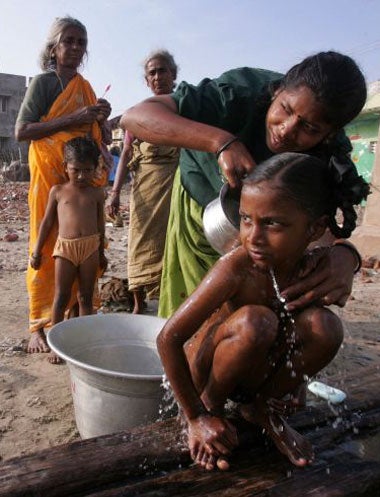Mental health team tackles the traumas the Tsunami survivors suffer

Keertana looks haunted and her staring eyes do not respond to smiles. For days after the tsunami hit her home in Tamil Nadu, southern India, the 10-year-old would not speak. Like many other children she used to stand on the shore and watch the fishermen. Now, she is scared of the sea. She has nightmares that the wave is coming back.
Seventy thousand Indians lost their homes and livelihoods here in the tsunami. The Boxing Day disaster, which killed 8,000 in southern Tamil Nadu, triggered another tidal wave, a range of problems from deep depression to more dangerous mental illnesses which are surfacing now.
The examples are endless, from the boy found in a rare catatonic state, clinging to an imaginary branch, to the hospital worker plunged into depression after finding his son among bodies he was identifying.
But Tamil Nadu's fishing villages are most at risk from a fear so simple and yet so debilitating it is threatening communities which have sat for generations on the Indian coast. These people, who for centuries have referred reverentially to their "mother sea," are now terrified of it. They are fishermen.
All along Tamil Nadu's coastline, new boats and nets bought by the international aid effort can be seen. But countless lie unused, their owners too scared to put to sea. The anniversary and wild seas of December have sharpened the fishermen's fear.
For the first time in India's history, a vast network of psycho-social care has been set up to combat psychological illnesses triggered by the events of Boxing Day. It is, local experts insist, proving to be a turning point for psychiatric care in a country where mental illness is at best stigmatised and at worst ignored.
Counsellors with the charity ActionAid and other local partners are providing psychological care to those who most need it. Staff realised the wide-spread fear of the sea would be pounced on by the Indian government.
Ravi Pratap Singh, the ActionAid team leader, said: "For the past 15 or 17 years, the government has tried to push the fishing community from the beaches, away from the prime land to develop it for tourism. The government saw this an opportunity to displace people in the name of fear."
For people such as Annapoorani Govindaraj, 60, the idea is appealing. She survived the tsunami by clinging to her roof. But the 10 rows of houses which buffered her from the sea have disappeared, along with most of the beach. Now they lie in rubble and the sea laps feet from her door. "If I am offered a house away from this place, even if I am starving, I will be happier," the grandmother said.
But ActionAid's Indian staff and other local partners know other resettled fishing communities have withered. Government handouts - £47 a month for the first three months and £1,240 per dead relative - will not last long with no breadwinner. Mr Singh said: "The fisher folk operate on the basis of a change in the colour of the sea so they can start fishing at three in the morning. If they moved 5km away there would be no chance for them to observe such minor things and their livelihood would be drastically affected.
"They didn't realise how it was going to affect their livelihoods. Most were actually saying they wanted to remain where they were. We started building a psycho-social support programme."
But 30 trained counsellors and one psychiatrist could not cope with 300,000 people, so they recruited locally. The insiders, once trained, were quick to recognise cases which women would not have revealed to a stranger. To date ActionAid has offered individual counselling to 3,000 and group therapy to 35,000.
Shanmugasundaram, a fresh-faced 16-year-old, has overcome fear of the sea and returned to fishing. He looks after his sister and younger brother because the waves killed his widowed mother.
In a relief camp, he said all he wanted was a good husband for his sister and to ensure his younger brother is educated so he does not have to fish. But if that does not happen, Shanmugasundaram had another wish. "We don't mind another tsunami, if we died in that tsunami."
Join our commenting forum
Join thought-provoking conversations, follow other Independent readers and see their replies
Comments
Bookmark popover
Removed from bookmarks